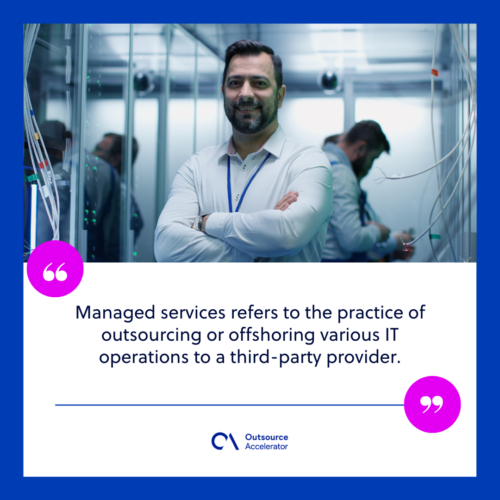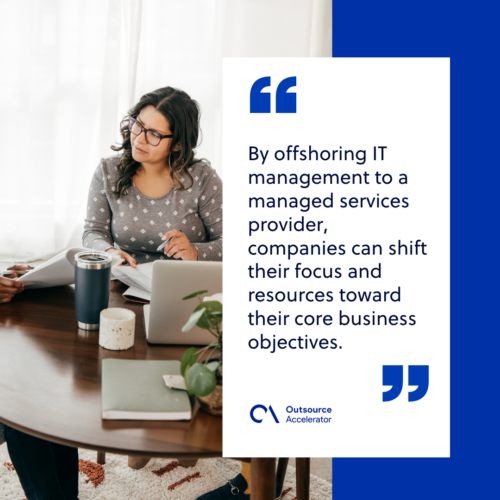The hidden value of managed services

Today’s fast-paced business landscape requires organizations to grapple with the challenges of managing complex IT systems while remaining focused on their core operations.
As businesses rely on technology to drive growth, the traditional IT support model is falling short. That’s where managed services come in.
The rise of managed services has changed how companies approach their IT infrastructure’s maintenance, security, and optimization. By leveraging the expertise of specialized providers, they can offload the burden and access a new suite of services.
This article examines the benefits of managed services and how ConnectOS can build you an offshore team to provide reliable solutions.
Understanding managed services
Managed services refers to the practice of outsourcing or offshoring various IT operations to a third-party provider. These firms assume responsibility for managing, maintaining, and optimizing those functions.
Managed service providers (MSPs) offer a broad range of services, including:
- Data backup
- Disaster recovery
- Network monitoring
- Help desk support
- Cybersecurity
- System maintenance
- Software as a Service (SaaS)
By taking a proactive and preventive approach, managed services aim to enhance system performance, uptime, and reliability. This model helps organizations save costs, time, and other valuable resources associated with managing an in-house IT team.

Managed services vs. In-house services
Managed services and in-house services are two different approaches to handling an organization’s IT needs.
Here’s a comparative analysis of the two methods:
| Managed services | In-house IT services | |
| Ownership and responsibility | Responsibility lies with the service provider | Organization retains full control and responsibility |
| Expertise and specialization | Offers specialized expertise | Internal staff may have broad skills but lack specialized knowledge |
| Cost structure | Follows a subscription model, and initial setup costs are lower | Involves higher upfront costs |
| Scalability and flexibility | Easily scalable and is flexible in accessing additional resources | Scalability may be constrained, requiring time and investment |
| Risk management | Service providers often assume some tasks, mitigating security and compliance concerns | Organizations bear full responsibility for risk management |
| Implementation time | Quicker implementation time | May require more time for hiring, training, and setting up internal processes |
| Customization | Providers offer standardized services with some degree of customization | Allows for full customization to meet specific needs |
Benefits of managed services
Managed services offer a host of advantages to businesses, transforming the way they manage their IT infrastructure and operational processes.
Here are some notable benefits of managed services:
Cost savings
Managed services help lower labor costs by eliminating the need to hire and train in-house IT staff. The partner also provides infrastructure, software licenses, and equipment, allowing organizations to avoid those upfront costs.
Additionally, managed services frequently operate on a predictable subscription model so that businesses can budget effectively.
Expertise and specialized skills
Managed services give access to a team of specialized professionals with extensive IT knowledge and experience. This ensures that businesses benefit from the latest industry knowledge and best practices.
Proactive support
Managed services providers offer proactive, continuous monitoring and maintenance of IT systems. They can identify and resolve issues before they critically impact operations.
This approach helps prevent costly downtime and improves system reliability and performance.
Scalability and flexibility
Managed services can easily scale resources up or down based on your needs, allowing flexibility.
Whether expanding infrastructure or adding new users, managed services provide the necessary agility to support organizational growth.
Enhanced security
Managed services providers prioritize cybersecurity and implement robust measures to protect IT systems from threats and vulnerabilities.
They also ensure compliance with industry regulations and standards, reducing the risk of legal and financial repercussions.
24/7 support
Many managed services providers offer round-the-clock support. This strategy ensures prompt assistance and quick resolution of IT issues at any time.
Having a larger support coverage minimizes downtime and maximizes operational efficiency.
Focus on core business
By offshoring IT management to a managed services provider, companies can shift their focus and resources toward their core business objectives.
This enables them to concentrate on strategic initiatives, innovation, and improving overall productivity.

ConnectOS as your managed services partner
When managing your business’s IT infrastructure, applications, and security, you can trust a partner like ConnectOS to provide efficient and reliable solutions.
With its extensive offshoring expertise and commitment to delivering top-notch services, your business can thrive and succeed.
When you collaborate with ConnectOS to build an offshore team, you’re opting for more than a solution. You’re embracing a transformative partnership that prioritizes your success.
Contact ConnectOS today to learn more about how it can empower your business through exceptional managed services.







 Independent
Independent




